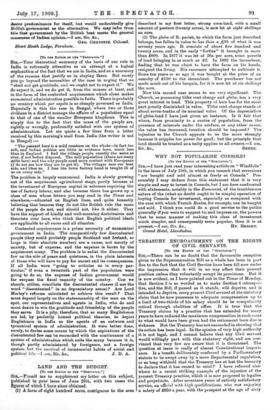• LAND AND ThE BUDGET.
rro THE EDITOR OF as “gekerAToe..-J gin,—P..irmit Me to supplement my letter on this suhlect, published hi your issue of June 26th, with two cases the Pres of which I have since obtained.
(1) A farm of eight kindred acres, dontignouti to the area described in my first letter, strong corn-land, with a small amount of pasture (twenty acres), is now let at eight shillings an acre.
(2) The glebe of R. parish, to which the farm just described belongs, has fallen in value to less than a fifth of what it was seventy years ago. It consists of about five hundred and twenty acres, and in the early "forties" it brought in more than £800. In 1877 it was let at 26s. per acre, some parcela of land bringing in as much as £2. In 1892 the incumbent; finding that he was about to have the farm on his hands, resigned the living. His successor attempted to cultivate it: Some ten years or so ago it was bought at the price of an annuity of 2150 to the incumbent. The purchaser has not made much out of his bargain, for it is now let at six shillings the acre.
Now this second case seems to me very significant. The Church, as possessing tithe rent charge and glebe, has a very. great interest in land. This property of hers has for the most part greatly diminished in value. Tithe rent charge stands at about seven-tenths of its nominal value. Of the depreciation of glebe-land I have just given an instance. Is it fair that where, from proximity to a centre of population, from the presence of minerals under the surface, or any other cause, the value has increased, taxation should be imposed ? The injustice to the Church appeals to us the more strongly because it cripples her power for good; but the principle that land should be treated as a unity applies to all owners.—I am,








































 Previous page
Previous page